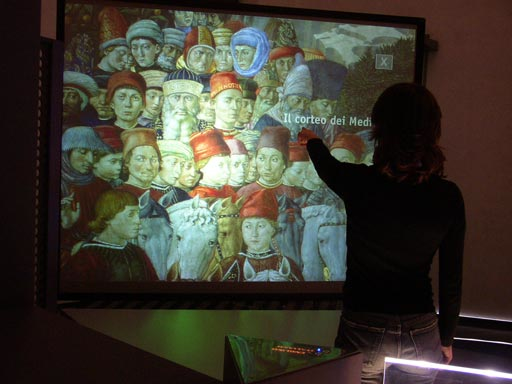Palazzo Medici Riccardi is one of the most important museums in Florence: in its small chapel, it hosts the famous fresco “La cavalcata dei magi” (“The Journey of the Magi”) by Benozzo Gozzoli (1421–1497).
The PointAt system’s goal is to stimulate the visitors to interact with a digital version of the fresco and, at the same time, make them interact in the same way they will in the chapel, reinforcing their real experience with the fresco. That is to use information technology to make teaching attractive and effective.

PointAt at Palazzo Medici Riccardi
Visitors are invited to stand in front of the screens and indicate with their hand the part of the painting that interests them. Two digital cameras analyse the visitors’ pointing action and a computer vision algorithm calculates the screen location where they’re pointing. The system then provides audio information about the subject.
In designing the system, we considered the following issues:
- Easy and simple interaction. Visitors don’t need any instruction or have to wear any special device.
- High-resolution display. The fresco is displayed on large screens so that visitors can appreciate even small particulars (almost invisible in the real chapel).
- Interactivity for different categories of visitors. Interaction should be satisfactory for visitors who just want an idea about the fresco, for those who are attracted by particular characters and for those who want to have complete information on the whole fresco.
- Not intrusive setting. The physical setting must host both active and passive visitors (for example, the relatives of the person who’s actually interacting with the system and those interested in listening but not in being active).
- Pleasant look & feel. The interactive environment is integrated within the museum and it respects the visitors’ whole experience.
PointAt is considered to be a good vanguard experiment in the field of museum didactics, and has been functioning successfully since 2004.